| Srl | Item |
| 1 |
ID:
132511
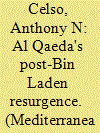

|
|
|
|
|
| Publication |
2014.
|
| Summary/Abstract |
The Barack Obama administration's May 2013 assessment of al Qaeda's weakness and fracturing in the post-bin Laden era has been greeted with indignation by both liberals and conservatives. They believe al Qaeda is stronger than ever in the wake of the Arab Spring. These critics, however, misunderstand the network's dysfunctional direction. Al Qaeda's "resurgence" is likely to lead to its failure. The argument proceeds on four levels: (1) the dramatic growth of the al Qaeda network masks its internal weakness and organizational splintering; (2) the Arab Spring has led to a burst of al Qaeda activism that is likely to undermine its jihadist cause; (3) al Qaeda's fragmentation and its multiple trajectories in the post-9/ 11 era violate bin Laden's original intent and are beyond al Qaeda Central's direction; and (4) the dysfunctional nature of al Qaeda's ideology and its excessive reliance on takfiri violence is paradoxically a source of both persistence and failure.
|
|
|
|
|
|
|
|
|
|
|
|
|
|
|
|
| 2 |
ID:
132512
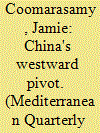

|
|
|
|
|
| Publication |
2014.
|
| Summary/Abstract |
The essay summarizes a recent reporting trip by the author to Tajikistan and Kyrgyzstan for the BBC, during which he examined the reasons for and observed the practical impact of China's growing influence in the former Soviet republics of Central Asia. The author provides a firsthand account of the scale and scope of Beijing's economic and, to a lesser extent, cultural investment in the region and of the way that local society is reacting to the changes. The essay also considers what the effects are for the traditional regional power, Russia, and looks at the Kremlin's response to the arrival of China as a major player in Central Asia.
|
|
|
|
|
|
|
|
|
|
|
|
|
|
|
|
| 3 |
ID:
132515
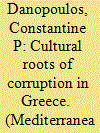

|
|
|
|
|
| Publication |
2014.
|
| Summary/Abstract |
Despite periods of growth, modern Greece is no stranger to severe and prolonged economic crises. Analyses of Greece's current economic crisis have stayed clear of the seminal importance of culture as a key variable responsible for widespread and persistent corruption that has deprived the country of a viable and sound economic foundation. This essay seeks to fill the void by concentrating of the cultural roots of corruption and the sources and factors that generate, nurture, and maintain high levels of corruption in the Greek setting. Borrowing from anthropological literature, the essay utilizes nine cultural dimensions of corruption: uncertainty avoidance, future orientation, institutional/societal collectivism, individual/in-group collectivism, human orientation, performance orientation, power distance, assertiveness, and gender egalitarianism.
|
|
|
|
|
|
|
|
|
|
|
|
|
|
|
|
| 4 |
ID:
132516
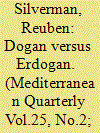

|
|
|
|
|
| Publication |
2014.
|
| Summary/Abstract |
The confrontation between Turkey's Justice and Development Party (AKP) and media mogul Aydin Dogan illustrates a major shift that has occurred in Turkey since the early 2000s. Dogan Holding is part of a traditional economic elite dominated by a number of large, coastal firms. The AKP is supported by a new generation of businessmen from Anatolia. This essay uses the conflict between the two to spotlight the competing networks of businessmen and politicians that dominate present-day Turkey.
|
|
|
|
|
|
|
|
|
|
|
|
|
|
|
|
| 5 |
ID:
132513
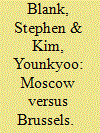

|
|
|
|
|
| Publication |
2014.
|
| Summary/Abstract |
Many see the western Balkans as the back yard of Europe. As the promise and reality of regional economic integration has weakened, however, Russia has returned to the area to play its historically important regional role. In the Balkans, a Russian or Russifying project competes against a European Union project, while Washington has shown little interest in the Balkans during the Barack Obama administration. The instruments of this rivalry are not only, or even primarily, armies but rather economic-political forces: control of energy pipelines and production, the use of that control for political objectives, and the attraction of competing political models.
|
|
|
|
|
|
|
|
|
|
|
|
|
|
|
|
| 6 |
ID:
132510
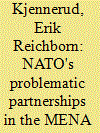

|
|
|
|
|
| Publication |
2014.
|
| Summary/Abstract |
This essay analyzes how the North Atlantic Treaty Organization (NATO) is likely to address the new security environment in the Middle East and North Africa (MENA) region. It investigates how factors internal and external to the alliance shape the possibilities and limits for its ambition to strengthen and develop its regional partnerships in order to enhance security and stability there. NATO's ambitions are likely to be hampered by competing priorities within the alliance, as the as the members are increasingly facing diverging interests and financial austerity as well as domestic political change and regional rivalries in the MENA region.
|
|
|
|
|
|
|
|
|
|
|
|
|
|
|
|
| 7 |
ID:
132514
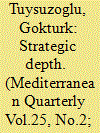

|
|
|
|
|
| Publication |
2014.
|
| Summary/Abstract |
The change in Turkish foreign policy in the twenty-first century's second decade has its origin in the approach referred to by Turkish foreign minister Ahmet Davutoglu as Strategic Depth. Because it aims to give Turkey status as a Eurasian power, this approach has been described as neo-Ottomanism, referencing the geographic extent of the Ottoman Empire. Because of its intrinsic pragmatism and the geographical region that is its focus, Strategic Depth has been influenced by Eurasianist thought in Russia. But the Strategic Depth approach differs from Russian Eurasianist ideas because it refuses to place itself in conflict with Western civilization and instead positions Turkey as a bridge between Western and Muslim civilizations. To this extent, Strategic Depth may be described as a conservative interpretation of Turkish Eurasianism.
|
|
|
|
|
|
|
|
|
|
|
|
|
|
|
|